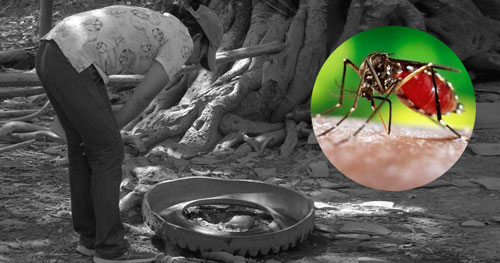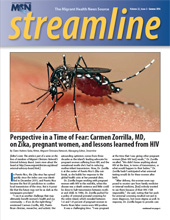Zika virus in the exam room: What do clinicians need to know?

[Editor’s note: This article is based on a recent blog post announcing Migrant Clinicians Network’s new Zika Virus information page. Learn more on our new Zika page: http://www.migrantclinician.org/issues/zika. Keep tabs on our active blog at http://www.migrantclinician.org/community/blog.html.]
Migrants may have a higher risk of contracting Zika and other mosquito-borne illnesses as a result of their mobility, poverty, and occupational opportunities. Many migrants traveling to the US are from areas of outbreak, and may arrive in the US after exposure. And, in areas of active outbreak like Puerto Rico, migrants who work outdoors like migratory agricultural workers are at a greater risk of exposure simply by the increased risk of mosquito bites. Many of these workers, due to poverty and availability of housing, return after work to homes that lack screens on doors and windows. Substandard housing once again ups their risk of mosquito bites, which augments further their risk of contracting the Zika virus.
In addition to these exposure concerns, migrants also face serious barriers that limit migrants’ health literacy and basic health care access. Migrants are an underserved population who may not be able to access health care or even basic health education on the Zika virus before, during, and after migration. As migrants move to and through the US in search of work or a better life, they encounter compounding barriers to care including cultural and linguistic barriers, fear over immigration status, inability to take time off work, lack of transportation, and lack of information on locally available health services — all of which reduce the likelihood of a migrant learning about the Zika virus and the associated risks, and of seeking out health services, should he or she contract the virus.
Consequently, as is noted in MCN’s new Zika Virus information page, when it comes to the Zika virus, migrants may warrant greater attention from clinicians in the exam room:
- Clinicians should determine whether the patient has recently traveled to an area experiencing a Zika outbreak OR if the patient intends on moving to such an area in the future.
- Any patients presenting the Zika virus symptoms within two weeks of traveling to an infected area should undergo serum testing. Zika symptoms are similar to those of dengue and chikungunya, and the diseases are often found in the same area (as they are spread by the same type of mosquitoes). The CDC notes that it is important to rule out dengue, as proper clinical management can improve outcome.
- The Food and Drug Administration (FDA) has issued an Emergency Use Authorization (EUA) for two diagnostic tools: the Zika MAC-ELISA and Trioplex real-time reverse transcriptionpolymerase chain reaction (rRT-PCR) Assay. The CDC requests that clinicians contact their state or local health department to facilitate testing. The CDC’s full instructions for sending diagnostic specimens, and more information on diagnostic testing, is at http://www.cdc.gov/zika/hc-providers/diagnostic.html.
- Patients who intend to travel to areas of Zika outbreak should be aware of the risks. All migrant women of childbearing age should be asked about their future travel plans. All migrant women who are pregnant or considering pregnancy should be encouraged to delay travel to areas with a Zika outbreak if possible. Resources, including fact sheets for pregnant women and a preconception counseling guide, are available from the CDC in English and Spanish.
Migrant women who may have been exposed to the Zika virus and who will be leaving your clinic require special attention. For patients who are pregnant and are suspected to have been exposed to Zika:
- Follow the most recent CDC recommendations on evaluation and testing.
- Provide information to the patient on the risks of exposure and the need for ongoing evaluation.
- Enroll the patient in Health Network, to ensure the patient is evaluated, continues treatment and/or can receive the results of serum testing at her next location. Health Network is Migrant Clinicians Network’s bridge case management program, assuring continuity of care and treatment completion by providing comprehensive case management, medical records transfer, and follow-up services for mobile patients. Learn about enrollment in Health Network at http://www.migrantclinician.org/services/network.html.
Resources
MCN’s Zika Virus information page contains links to many resources to assist clinicians in serving mobile patients: http://www.migrantclinician.org/issues/zika
MCN’s Health Network is key to assuring that mobile patients stay in care: http://www.migrantclinician.org/services/network.html
The CDC’s Zika Virus for Healthcare Professionals offers clinical guidance and resources like archived webinars: http://www.cdc.gov/zika/hc-providers/index.html
The CDC’s Zika Virus Tools for Healthcare Providers includes fact sheets and guides in English and Spanish: http://www.cdc.gov/zika/hc-providers/tools.html
The CDC’s Diagnostic Testing site gives complete instructions on how to test and where to send samples: http://www.cdc.gov/zika/hc-providers/diagnostic.html
Return to the Streamline Summer 2016 Table of Contents.
Read this article in the Summer 2016 issue of Streamline here!
Sign up for our eNewsletter to receive bimonthly news from MCN, including announcements of the next Streamline.
Return to the Streamline Summer 2016 Table of Contents.
